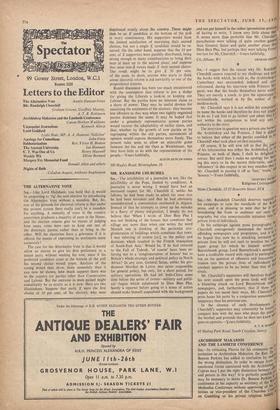MR. RANDOLPH CHURCHILL
SM,—The infallibility of a journalist is not, like the infallibility of the Pope, limited by conditions. A journalist is never wrong. I would have had an increased respect for Mr, Churchill if, unlike his fellows, he had been ready to admit for once that he had been mistaken and that he had obviously misunderstood a conversation overheard in Algiers. Instead of that he attempts to cover up his mistake in a flurry of phony indignation, I simply do not believe that 'When I wrote of Dien Bien Phu I was not thinking of the houses that constitute that village any more than when one writes the word Munich one is thinking of the particular con- glomeration of buildings which constitute that town. I was referring of course [sic], to the policy and decisions which resulted in the French evacuation of South-East Asia.' Would he, if he had referred to the Fall of Tobruk, 'of course' have been re- ferring not to a 'conglomeration of houses' but to Britain's whole strategic and political policy in North Africa? In any case, General Satan, unlike his pre- decessor Marshal de Lattre, was never responsible for general policy, but only, for a short period, for military operations. He had left Indo-China some time before the series of events—military and politi- cal—began which culminated in Dien Bien Phu. Surely a reporter before going to a scene of action should make himself acquainted with the background THE SPECTATOR, JUNE 13, 951 and not put himself in the rather ignominious position, of having to write, 'I know very little about this It seems more than probable that Mr. Churchilrl parachutists were talking of quite another genet's' than General Salan and quite another place than Dien Bien Phu, but perhaps they were talking Frac' too fast for. Mr. Churchill.—Yours faithfully, C6, Albany, WI GRAHAM GRE
*
0113


































 Previous page
Previous page